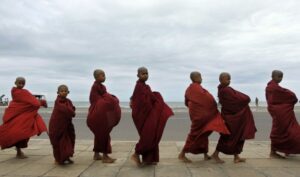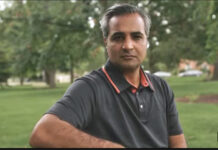By, Julia A. Seymour

Persecution of evangelical and pentecostal Christians is in on the rise in Sri Lanka, an island nation off the coast of India. In early September, a mob of 30 people led by three Buddhist monks attacked a Christian church in Meegoda, damaging instruments, furniture, and beating a pastor and his mother, according to Worthy News.
Barnabas Aid reported one of the monks knocked the pastor unconscious with a guitar and the mob demanded the parishioners stop holding prayer meetings because they claimed the village was a Buddhist village.
“Buddhist extremists or nationalists have been gaining influence in Sri Lanka and as a result, persecution of religious minorities has increased dramatically,” said William Stark, International Christian Concern’s regional manager for Southeast Asia. “According to these radical Buddhists, to be Sri Lankan you have to be Buddhist. … These Buddhist monks are using violence to try to force adherents of other religions, including Christianity, to either leave Sri Lanka or convert to Buddhism.”
Such attacks are growing. On Sept. 2, unidentified assailants threw plastic bags full of kerosene at a pastor’s house. The family awoke and the attackers ran off before lighting the bags. This year, Barnabas Aid counted 45 attacks on Christians or Christian churches in Sri Lanka. World Evangelical Alliance reported that two Buddhist nationalist groups—the Bodu Bala Sena(BBS) and the Sinhala Ravaya—were responsible for much of the persecution.
Due to threats, Sri Lankan authorities asked several churches to close Sept. 8. When the BBS threatened a church in Rathmalana this month, police showed up to protect the church and sent congregants away when they arrived for service.
In August, a Sri Lankan pastor told Baptist Press that persecution in his country is not just beatings and burned buildings: “What is happening is that churches are being shut down through local laws and orders. … It is thought that by taking away our meeting places that our growth will stop. They have closed down eight churches now in this way. But the truth is that we are growing without buildings. Our groups are multiplying.”
According to Stark, freedom of religion for Buddhists, Hindus, Muslims, and Christians is guaranteed by the constitution of Sri Lanka, but the same document gives top priority to Buddhism. Evangelical and pentecostal Christians, which make up a small minority, fall outside of those protections. The National Christian Evangelical Alliance of Sri Lanka has advocated that the government’s Department of Christian Affairs “represent all those who profess Christianity as their faith.” The organization noted that only Roman Catholics and members of the National Christian Council of Sri Lanka are represented.



